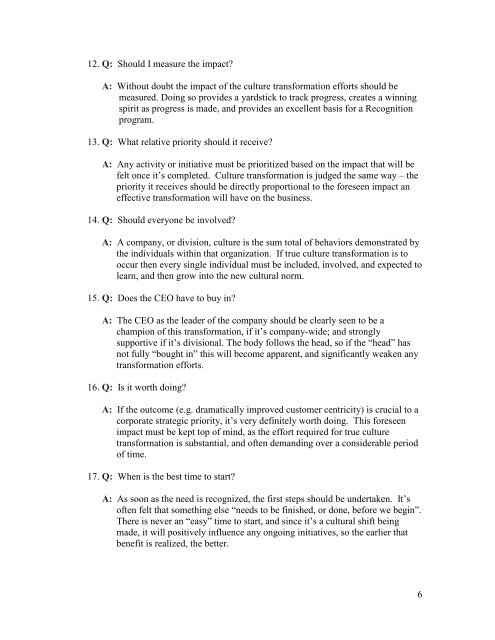Cultural Transformation
Cultural Transformation
Cultural Transformation
Create successful ePaper yourself
Turn your PDF publications into a flip-book with our unique Google optimized e-Paper software.
12. Q: Should I measure the impact?<br />
A: Without doubt the impact of the culture transformation efforts should be<br />
measured. Doing so provides a yardstick to track progress, creates a winning<br />
spirit as progress is made, and provides an excellent basis for a Recognition<br />
program.<br />
13. Q: What relative priority should it receive?<br />
A: Any activity or initiative must be prioritized based on the impact that will be<br />
felt once it’s completed. Culture transformation is judged the same way – the<br />
priority it receives should be directly proportional to the foreseen impact an<br />
effective transformation will have on the business.<br />
14. Q: Should everyone be involved?<br />
A: A company, or division, culture is the sum total of behaviors demonstrated by<br />
the individuals within that organization. If true culture transformation is to<br />
occur then every single individual must be included, involved, and expected to<br />
learn, and then grow into the new cultural norm.<br />
15. Q: Does the CEO have to buy in?<br />
A: The CEO as the leader of the company should be clearly seen to be a<br />
champion of this transformation, if it’s company-wide; and strongly<br />
supportive if it’s divisional. The body follows the head, so if the “head” has<br />
not fully “bought in” this will become apparent, and significantly weaken any<br />
transformation efforts.<br />
16. Q: Is it worth doing?<br />
A: If the outcome (e.g. dramatically improved customer centricity) is crucial to a<br />
corporate strategic priority, it’s very definitely worth doing. This foreseen<br />
impact must be kept top of mind, as the effort required for true culture<br />
transformation is substantial, and often demanding over a considerable period<br />
of time.<br />
17. Q: When is the best time to start?<br />
A: As soon as the need is recognized, the first steps should be undertaken. It’s<br />
often felt that something else “needs to be finished, or done, before we begin”.<br />
There is never an “easy” time to start, and since it’s a cultural shift being<br />
made, it will positively influence any ongoing initiatives, so the earlier that<br />
benefit is realized, the better.<br />
6

















